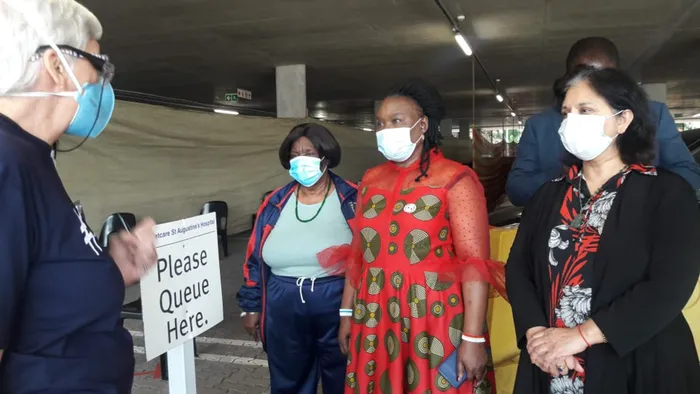Health-care workers urged to test people for Covid-19 before they vaccinate

Members of the provinical Health Portfolio Committee during the vaccination sites functionality monitoring visit. Pictured are, from left, Thokozile Gumede, committee chairperson Nomakiki Majola and Shameen Thakur-Rajbansi.
DURBAN - THE provincial portfolio committee on health has urged vaccination institutions to incorporate testing in the vaccination process, to avoid drawing unnecessary criticism of vaccines, as more people were required to vaccinate for the country to reach herd immunity.
This was revealed during the committee’s monitoring visits to assess the functionality of vaccination sites in eThekwini metro and five other district municipalities – Umkhanyakude, King Cetshwayo, Harry Gwala, Amajuba and uThukela.
Speaking at the St Augustine’s Hospital vaccination site in Durban, committee chairperson Nomakiki Majola said pre-assessment was critical in ensuring that people were vaccinated with a suitable jab to eliminate complications.
“I want to emphasise that the issue of testing should not be left behind in the vaccination process. If people are not tested prior to the vaccination, it would be difficult to tell if the complications were caused by the vaccine,” Majola said.
Majola stressed that the pre- and post-assessment were critical for safety compliance, as per the World Health Organization’s guidelines for vaccination sites.
Pre-screening involved vital measures including Covid-19 testing, the taking of blood pressure, the measuring of oxygen concentration using oximeters, among others, which were not done.
Post-screening involved monitoring the vaccinated individual’s reaction 15 minutes after receiving the jab.
Majola thanked the private sector for working with the public sector, which she said showed that the National Health Insurance initiative was working.
“When we were at the vaccination site, we saw that the vaccines were being taken from the main fridge to the main site, which is security. At the site, we identified the issue of pre-observation, which was not done.”
Netcare St Augustine’s Hospital chief executive Heinrich Venter said they admitted 100 patients on a daily basis, who were informed and reminded about the hospital also being a vaccination site, for individuals with and without medical aid.
“We have reached out to the Durban University of Technology, which is now sending its students to get vaccinated at the hospital. Berea Tech students are also keen to come through,” said Venter.
He added that they were currently working on a strategy to get to student residences at universities and vaccinate students.
Venter said there was a need to rally people to get vaccinated.
“For our outreach programme, we intend to visit far rural areas such as Manguzi, as a pilot project. We need to come up with a solution on how we ensure that employees do not lose their salaries, while taking a day off to vaccinate,” he said.
Majola led the eThekwini metro delegation, with members Shameen Thakur-Rajbansi and Thokozile Gumede.
Thakur-Rajbansi said that for the vaccination process to work, there had to be a joint effort between various stakeholders.
“If the communities are not coming to our sites, we need to find a way to get to them, especially in the rural areas, where sites are far from where the people stay.”
She stressed a need to target areas such as campuses, the industrial hubs, the rural areas, state-owned enterprises and highly rural surroundings in order for the country to be able to reach herd immunity.
Gumede, who was hospitalised due to Covid-19, said: “You are overlooking now the pre-observation, the testing part. Many people don’t even show signs of being positive, yet they are positive. Then the next thing after 15 minutes (post-testing) there is nothing that will show, it will be later and fatal. And then we will say we do not know what happened.”
She emphasised that this had nothing to do with the vaccination sites, but the lawmakers who had to review the standard operating procedures.
“My little knowledge from where I studied is that if you give a vaccine, you give an attenuated dose of that virus. So, if I am already positive and you are giving me a dose, you are adding now and overloading my body with the virus, which is fatal,” Gumede said.
Lindi Mngomezulu, a Clicks Pharmacy manager in Chatsworth, told the committee that they were following all protocols to ensure no vaccines go to waste or were compromised.
The Jansen vaccine by Johnson & Johnson is an adenovirus-based vaccine, while BioNTech vaccine by Pfizer, is an MRNA-based vaccine.
Daily News
Related Topics: